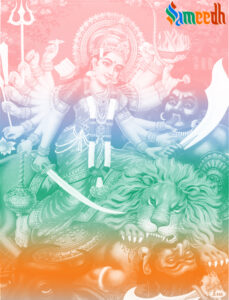Shumbha and Nishumbha are depicted as powerful demon kings who sought to conquer the heavens and overthrow the gods. When their advances were thwarted by the gods, they engaged in battle with Goddess Durga. Despite their strength and the aid of their powerful armies, they were ultimately defeated by the goddess.

Shumbha and Nishumbha were born from the lineage of the demon king Dambha. Endowed with immense power and arrogance, they aspired to conquer the three worlds (heaven, earth, and the underworld) and establish their supremacy over all beings.
Shumbha and Nishumbha were two powerful demon brothers who played significant roles in Hindu mythology, particularly in the Devi Mahatmyam (Durga Saptashati or Chandi Path). They are depicted as formidable adversaries of the gods and champions of demonic forces.
The story of Shumbha and Nishumbha is narrated in the Panchama Charitra (Fifth Episode) of the Chandi Path, where Goddess Durga confronts and vanquishes them, thus restoring peace and order to the universe. The story of Shumbha and Nishumbha is one of the prominent narratives found in the Devi Mahatmyam, also known as the Chandi Path or Durga Saptashati.
Using their extraordinary strength and cunning tactics, Shumbha and Nishumbha defeated the gods and usurped their celestial realms. They became the rulers of the universe, subjecting all beings to their tyrannical rule. Despite their vast dominion, Shumbha and Nishumbha desired to marry Mahadevi, the Great Goddess, who symbolized the divine feminine power. They believed that possessing her would augment their power and invincibility.
Upon learning of their intentions, Mahadevi revealed her true form as Goddess Durga, radiating with immense energy and wielding divine weapons. A fierce battle ensued between the demon brothers and the goddess.
Shumbha and Nishumbha sent their formidable armies, composed of various demons and mythical creatures, to confront Durga. Despite their relentless attacks, the goddess remained invincible, single-handedly defeating and destroying their forces.
In the climactic showdown, Durga engaged in a fierce combat with Shumbha and Nishumbha themselves. Despite their extraordinary strength and cunning tactics, they were no match for the goddess’s divine power. In the end, Durga vanquished Shumbha and Nishumbha, restoring balance and order to the universe.
The story of Shumbha and Nishumbha serves as a symbolic representation of the eternal struggle between good and evil, with the triumph of divine righteousness over demonic arrogance. It highlights the power of devotion, righteousness, and courage in overcoming adversity.
